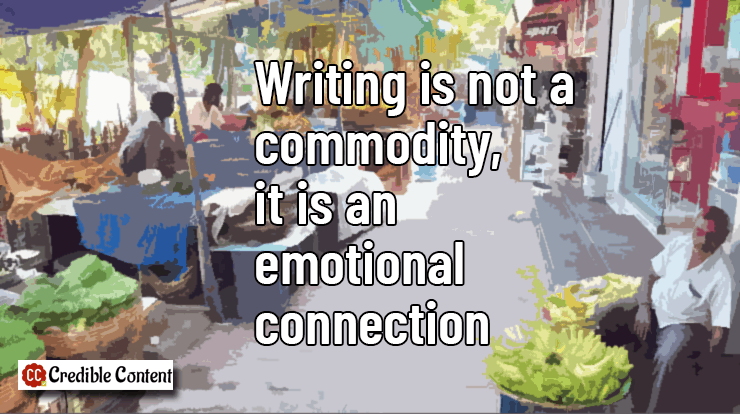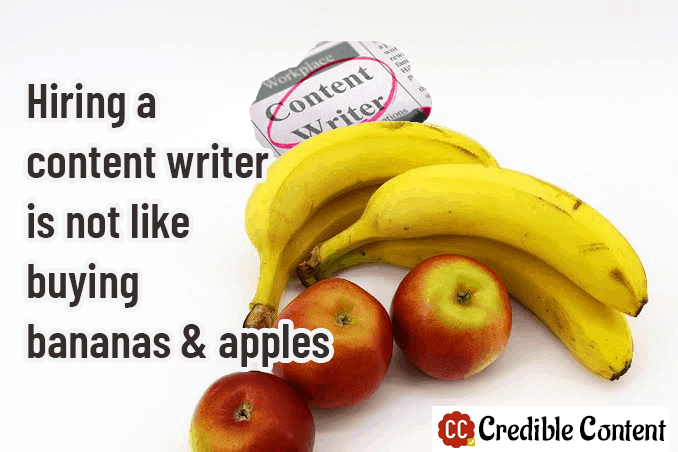I just had a conversation with a person who wanted to hire my content writing services. I thought I will just publish a few words regarding that.
Pricing is normally a big issue when it comes to deciding how much you want to pay your writer.
It is understandable.
When you are paying for something, in an ideal world, you want to get the highest quality at the lowest possible rate.
Do we live in an ideal world? No.
Just as you want to pay the minimum possible rate, the writer needs to charge the maximum possible rate the client can give. A writer earns his or her living writing.
There must be a common meeting ground between the lowest the client wants to pay and the maximum the writer needs to charge.
So, this person was quite upset about the minimum rate I had offered him, and what seems to be more offending to him is the fact that I’m charging the rate for Hindi writing, not even English.
Yup, native English speakers in the UK and the USA don’t have any problem paying for my English content writing services despite English not being my native language, but native Hindi speakers in India don’t want to pay for my Hindi content writing services despite Hindi being my native language, such is their attitude towards their own language.
But that’s a different topic I would like to write about some day.
The argument that writing is writing whether in Hindi or English, didn’t cut much ice.
There was a time when I didn’t use to have such discussions with prospective clients. I would simply say, “Great, look for another writer who will work on your rate.”
But these days sometimes I have conversations with them and try to explain to them that writing is not about paying for words. It is about paying for value.
Yes, I do tell my clients how much I’m going to charge per word or per page (depending on their preference) but this is just to give them an idea of the pricing. It is not to be taken literally. It is not like one is buying bananas and apples.
I told him that when clients hire me, they don’t hire me because I will charge a certain amount (yes, it is a factor, but not the only factor). They hire me because they want me to write for them the way I write for myself.
Most of my clients contact me after reading my blog posts and webpages on my website. They are looking for the writing skill I can offer.
Even among these clients, if some mention that, “Oh, XYZ is ready to work for 70% less of what you are charging,” I immediately understand that they’re not much bothered about the writing skill.
This also means that it doesn’t matter to them what type of writing they get. They simply want to fill up their webpages and blog posts and for that, any writer would do.
This is a clear message to me that I don’t want to get involved. Why would I get myself involved in a project where quality of writing does not matter?
Even if they’re getting better quality at a very low rate, good for them. Then also, why would I inconvenience myself and also deprive them of the quality that they may get from somewhere else?
Anyway, he said that it will be too costly for him because he wants to publish at least 5 updates every day.
I could totally understand his problem. Paying for 5 updates would be expensive for a person who is trying to build a new business while doing a job.
But then, the rate that he is ready to offer is not practical.
I mean, not at all.
I had offered him a minimum of Rs. 800 for a 450-500-word document. In dollars it is a little less than $11.
He said that the other writer he was talking to was ready to charge $2.
My first instinct, as it usually is, was to tell him what was he waiting for? He shouldn’t let such a writer go.
Contrary to what I usually do, I started a conversation with him.
“Look,” I said, “how much is $2? Around Rs. 144? How much time does it take to write a 500-word blog post? After all, it is not simply typing. You think about the topic, you form sentences, you rearrange them, you do research to find the right information, then you express that in your own words to create unique content and on top of everything, it should be well written, engaging and conversational. Including revisions, it takes more than an hour to write a good piece of 500 words, and that too when the needed information is easily available. Can you imagine what the quality of the writing must be if someone is charging Rs. 144 for working more than an hour? Even a plumber or a carpenter charges three times more than this. At least I’m charging like a plumber.”
He didn’t get the plumber joke.
My advice to him was: “If you cannot afford 5 updates per day, just go with 1-2 updates. I give this advice to all the clients who don’t have much money to spend but want to publish quality content. Ultimately, it is not the quantity that is going to build your presence, but the quality. Unless you make an emotional connection, your writing is not going to have an impact.”
He understood the quality part. He also understood the making an emotional connection part. He simply couldn’t get over the fact that he needed to pay almost $11 when he wants to pay $2.
I said all the best to him.
Writing is not a product, it is not a commodity, it is an emotional connection
Sure, by the end of the day all that matters is how much you pay and how much you get.
Having said that, I continuously say that writing is not a commodity. It is not something that you purchase off-the-shelf.
Just as your business website is unique, so is my writing.
Of course, when I’m charging, I need to be realistic. I must know how far my clients can stretch themselves while feeling happy about what they are paying for.
I also understand that once you are paying, you need to commodify because you need to pay per unit. This is why there are hourly rates, per page rates and per word rates. One needs to get an idea of how much he or she will be paying for these many pages, these many blog posts and these many words.
What I don’t understand is, expecting me to charge $2.
This is insulting, insensitive, and also self-defeating.
In what Lala land do these individuals exist and operate?
Would they ever spend more than an hour on a job that pays Rs. 144? If nothing else, at least have some self-respect.
Do you really want to publish such low-quality content on your website or blog?
And then they wonder why so few people want to do business with them.
When you are getting content written for your website remember that your prospective customers and clients are going to read that content and then decide whether they want to do business with you or not.
In a matter of a couple of seconds.
Your writing can make or break your business.
How your website looks may not affect your overall business, but your writing certainly does.
How your website looks has zilch effect on your SEO, but your writing certainly does.
The writing underpins your entire online existence.
If you underestimate the power of writing, I wonder how you’re going to succeed in your business.
Irrespective of how much you pay, the moment you stop, commodifying writing and start looking at it as an immensely important business asset, you will take the most important step towards creating a successful online business.



